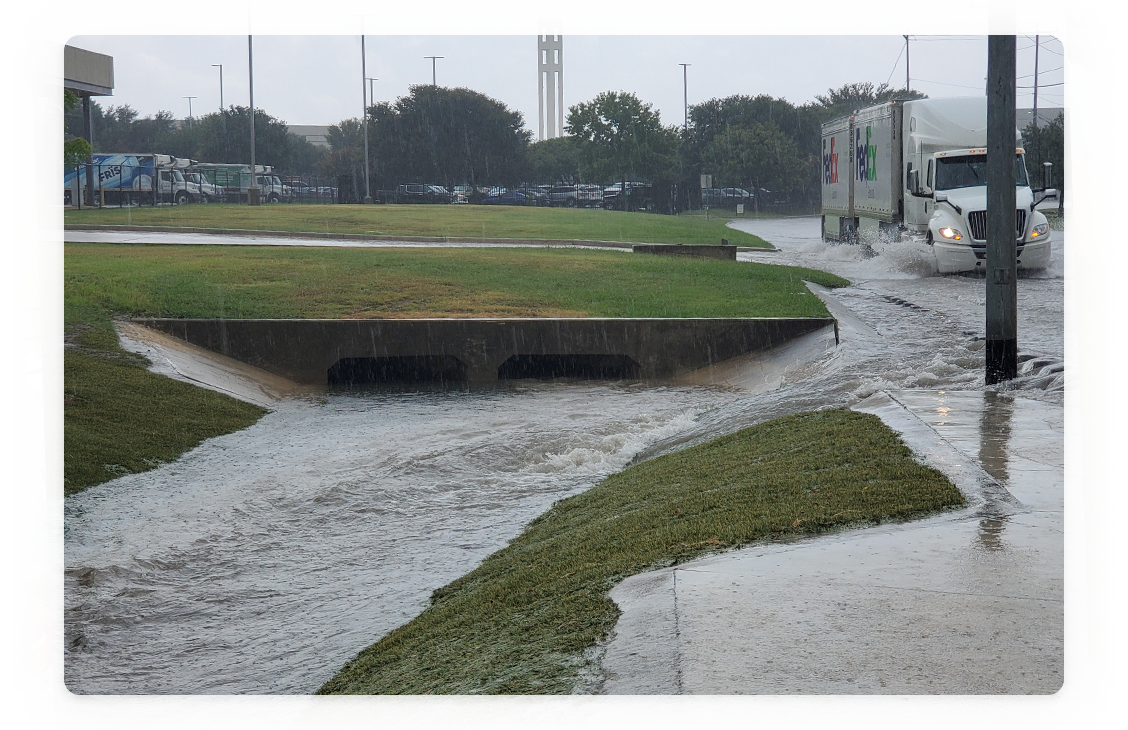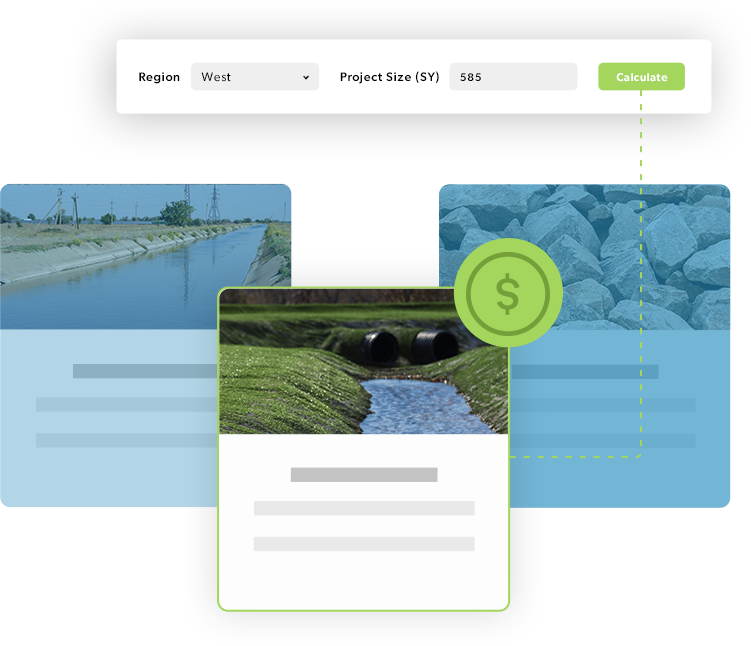
Your Ultimate Guide for Concrete Canvas
Don't let soil erosion and water penetration lead to the collapse of your erosion control installation projects. Improve the stability and lifetime value of your channel and ditch projects using Concrete Canvas. Concrete Canvas® is a flexible, composite, concrete-filled geosynthetic that hardens on hydration to form a thin, durable, and waterproof concrete layer. Identifying how your projects can benefit from using Concrete Canvas.
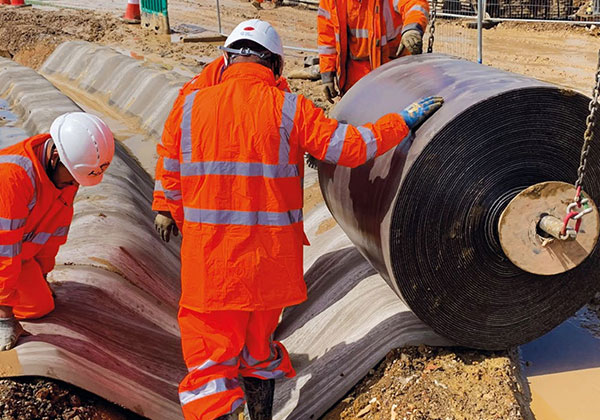
Concrete Canvas® is part of a revolutionary new class of construction materials called Geosynthetic Cementitious Composite Mats (GCCMs). It is a flexible, composite, concrete-filled geosynthetic that hardens on hydration to form a thin, durable, and waterproof concrete layer. Essentially, it’s concrete on a roll™. The following blog post provides helpful information for installers, customers, and specifiers of Concrete Canvas® GCCM (CC) and provides an overview of the material's technical data, applications, and properties.
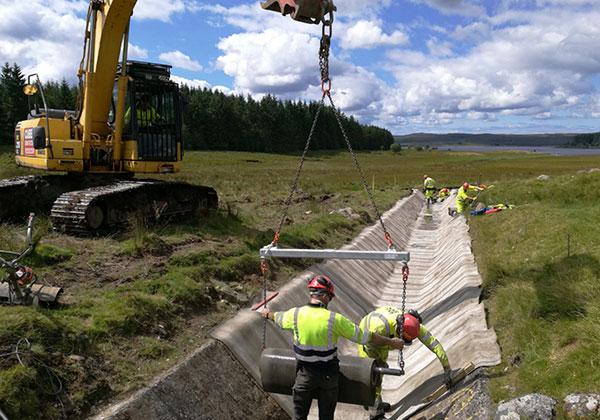
Concrete Canvas is unrolled into position and secured in place. The material is then hydrated. There is a 2-hour working window before the setting begins, and in 24 hours, the material hardens to service performance specifications.
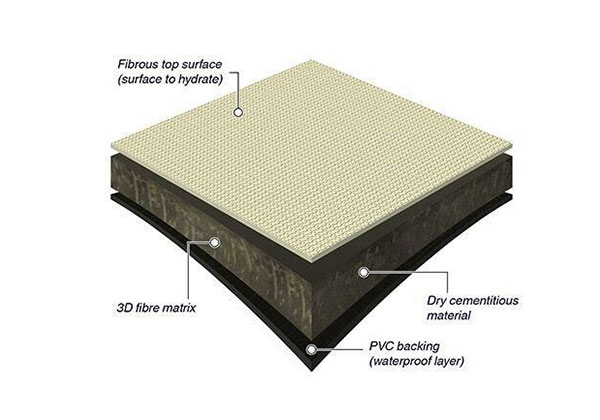
Concrete Canvas has gained global acceptance as an alternative to conventional concrete for erosion control and other applications. ASTM has established international performance standards which CC exceeds across all categories. Compressive strengths range from 6500 to 9400 psi and flexural strength is greater than 580 psi. CC provides better freeze thaw resistance and is less affected by abrasion than traditional concrete.
CC is BBA certified with the durability of over 120 years when used for erosion control applications. For advice on specific climates, please contact Concrete Canvas Ltd.
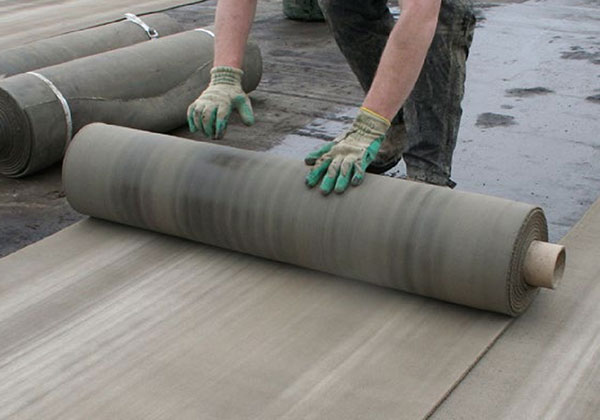
Concrete Canvas is manufactured on bespoke machinery that was created specifically for this product. The manufacturing process combines the geosynthetic top layer, the fiber reinforced cementitious layer and the waterproof backing layer in a way that allows for the product to remain flexible throughout the shipping and installation process while ensuring that the cementitious material remains evenly distributed throughout the material even in vertical applications. Concrete Canvas is manufactured under an ISO.
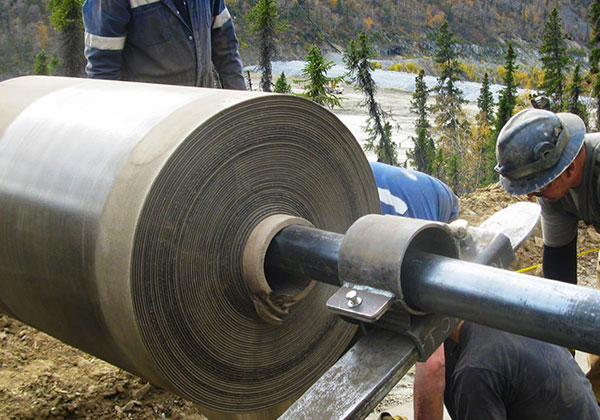
The level of waterproofing that materials provide is typically referred to in geotechnics using a measure of permeability called the k-value. CC has been tested to BS1377 and has an average k value of between 10-8 and 10-9 m/s, similar to clay, a range commonly referred to as impervious. The permeability of a CC-lined structure can be adjusted by selecting an appropriate method for joining the material.
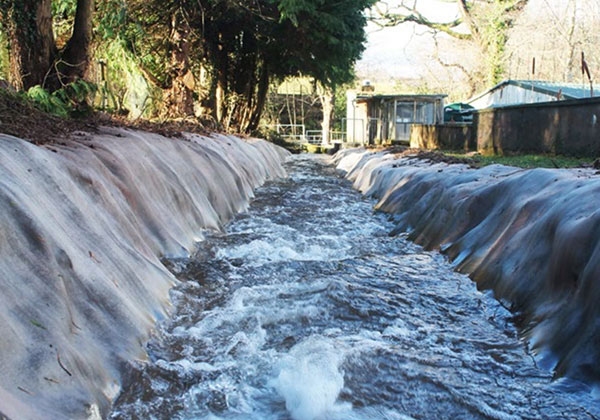
Yes. One of the critical features of CC is that the fixed internal volume and control during manufacture ensures void space is set within carefully prescribed bounds and subsequently limits the Water: Cement ratio achieved in the field. It is therefore not possible to over hydrate CC; it will set underwater and can, therefore, be installed in adverse weather conditions. Once wet, CC has a working time of approximately 1-2 hours.
CC can be supplied as either palletized bulk rolls or man-portable batched rolls. Type I bulk rolls are 2153ft², Type II are 1346ft², and Type III are 861ft². Type I batched rolls are 108ft², and Type II are 54ft². Due to its relative weight, Type III is not available in batched rolls.
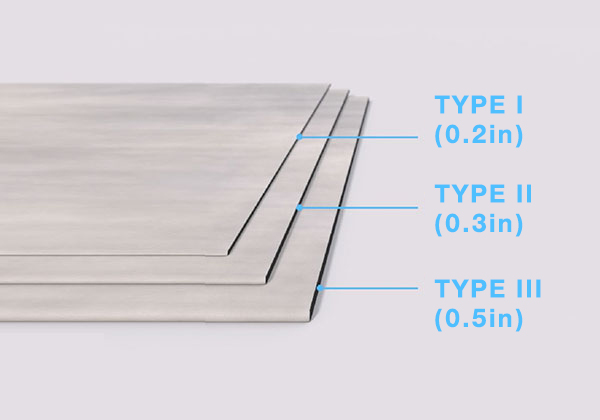
Concrete Canvas® GCCM has nominal dry weights of 1.43lbs/ft², 2.46lbs/ft², and 3.89lbs/ft² for Type I, Type II, and Type III, respectively.
CC is packaged in heavy-duty, waterproof wrapping at the manufacturing facility and should be stored under cover in dry conditions, away from direct sunlight.
When stored in the manufacturer’s packaging in the right conditions, CC can be kept for up to 24 months from the manufacture date without significant degradation in performance. After the 24-month point, CC will continue to function but may take longer to reach the values specified on the CC Data Sheet.
The performance values of CC will decline once opened; the CC should, therefore, be used within a few days to prevent any significant degradation. It is best practice to reseal any packaging after opening to extend this period as much as possible.
CC is stocked and supplied in its natural color (mottled gray) as standard. There are several options for coloring CC, including dying the surface fabric fibers or applying colored surface treatments, such as painting the fiber surface of CC with a good quality exterior masonry paint. It is recommended to seek advice from a CC representative before painting or dying. In terms of available widths, our standard roll width is 3.28 ft. Custom widths can be made available by contacting your local GEO Pro.
One of the critical features of CC is that the fixed internal volume and control during manufacture ensures void space is set within carefully prescribed bounds and subsequently limits the Water: Cement ratio achieved in the field. It is therefore not possible to over hydrate CC; it will set underwater and can, therefore, be installed in adverse weather conditions.
The price of CC is volume-dependent, and the price/m² drops when ordering large volumes. Contact your local Concrete Canvas Ltd rep for a quote specific to your requirements and delivery location.
CC typically replaces 4-6in of poured, sprayed, or precast concrete, resulting in typical material savings of 95%. This directly results in a reduction in the carbon footprint of construction works. A recent Life Cycle Assessment found that CC8™ contains 45% of the embodied carbon when compared to a 6in ST4 poured concrete channel before the transportation and installation carbon savings are also considered.
CC has excellent resistance to chemical attack and is generally much more resistant to aggressive compounds than conventional OPC based concretes. CC has been successfully tested by 56 day immersion in acid down to pH 1.0 and alkaline up to 13 with no loss of strength. CC also has excellent resistance to sulfates, sulphated water, ground, and sea water, and has good resistance to many compounds that attack OPC, including; sewage water, chlorides, tanning oils, vegetable oils, and most mineral salts.
Concrete Canvas® GCCM (CC) is typically used to replace conventional concrete for various erosion control and weed suppression applications. Typical examples include canal/ ditch lining, slope protection, berm lining, remediation works, culvert lining, gabion covering, and pipe protection.
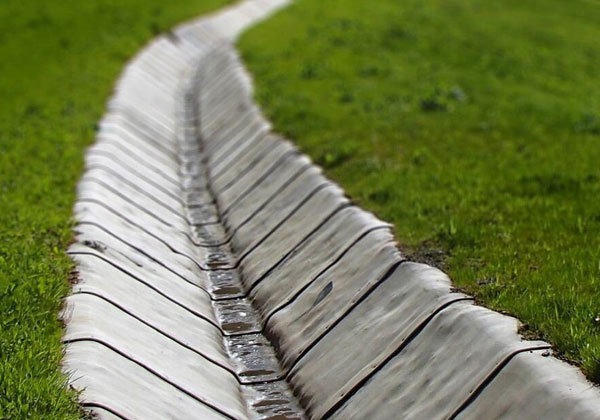
Canal Lining
CC can be used to provide a hard-wearing erosion control surface for lining channels for drainage and irrigation. CC is typically used as an alternative to conventional concrete drainage where vegetated or earth-lined ditches are unsuitable due to high flow rates, containment requirements, or the need to reduce maintenance. For full details of how to line a channel with CC, please see the CC Installation Guide: Channel Lining.
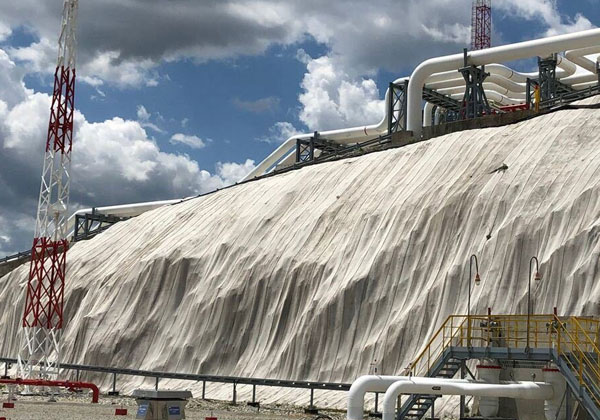
Slope Protection
CC can be used to provide a hard-wearing erosion control surface to protect slopes from environmental degradation. CC is typically used to replace shotcrete where vegetated slopes are unsuitable due to ground water, arid climate or poor soil conditions. For full details of how to line a slope with CC, please see the CC Installation Guide: Slope Protection.
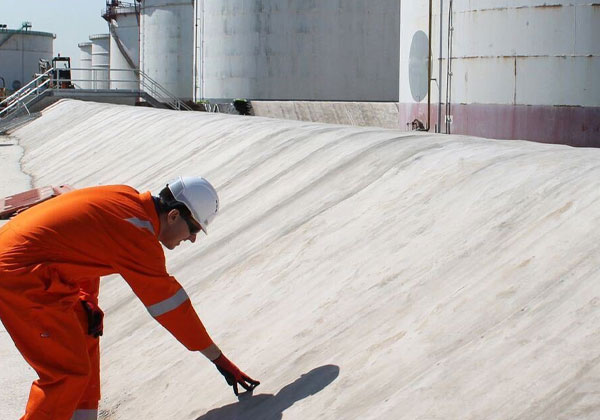
Berm Lining
CC can be used to provide hard armor capping of secondary containment berm around petrochemical tank farms, munitions depots, and flood defenses. CC is typically used to protect the bund from environmental degradation and animal damage, improve impermeability, and prevent weed growth. For full details of how to line a bund with CC, please see the CC Installation Guide: Bund Lining.
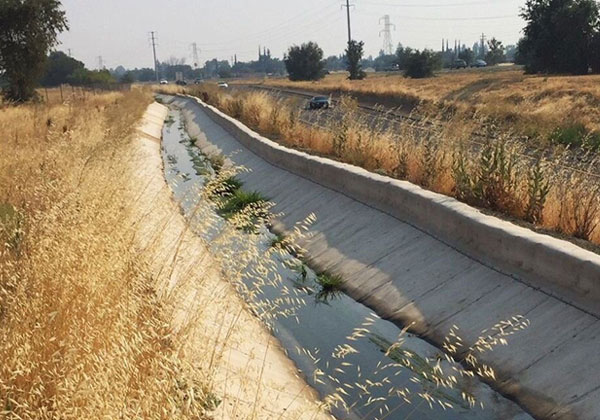
Concrete Remediation
CC can be used to reline concrete infrastructure which has become cracked and damaged and requires remediation. CC is used to extend the life of existing infrastructure, reduce leakage and improve flow characteristics. CC can be used as an alternative to rebuilding or where lining with a flexible membrane is unsuitable due to the flow conditions or durability concerns.
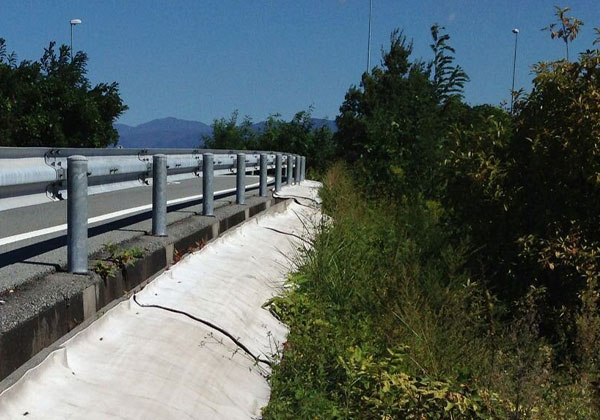
Culvert Lining
CC can be used to reline steel and concrete culverts that have degraded due to scour and corrosion. CC is used to extend the life of culverts and provide a hard-wearing erosion control layer with improved impermeability and flow characteristics. CC can be used as an alternative to relining with bitumen, GRP, polyurethane, or sprayed concrete.
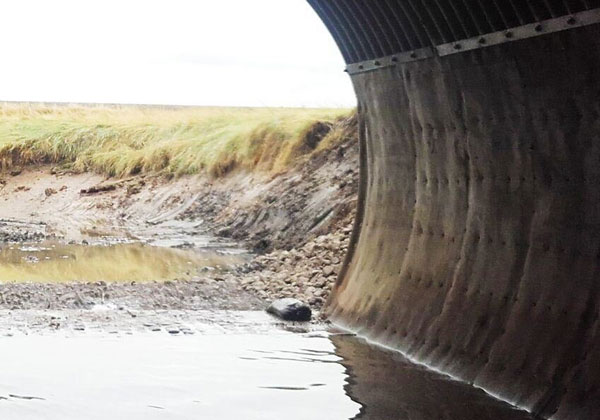
Weed Suppression
CC can be used to provide long-term weed growth prevention in areas where maintenance is complex such as around sensitive infrastructure or in remote locations. CC is typically used as a replacement for precast concrete slabs where conventional geotextiles do not provide sufficient durability.
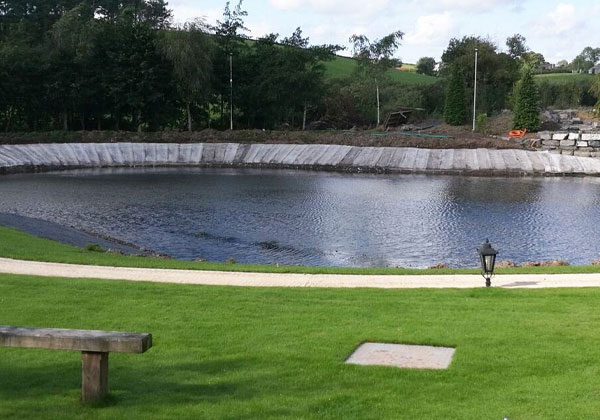
Outfalls / Spillways
C can be used to protect surfaces in high-flow areas prone to erosion, such as underneath culvert outlets, spillway surfaces, and over-toppings. CC is typically used to replace conventional concrete solutions and is applied in the same manner as CC slope protection. Thickness selection should be made based on the maximum expected flow rate.
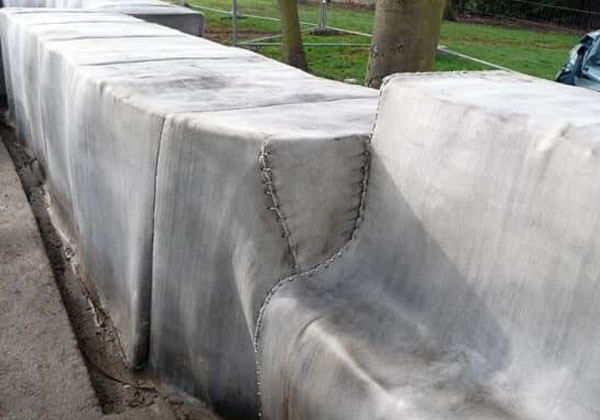
Gabion Protection
CC can be used to cover steel baskets and geotextile gabions to prevent damage from corrosion, UV damage, and vandalism. CC significantly extends gabions' life, providing a hard-wearing surface that will last for decades. CC can also be used to cap earth-filled gabions to prevent FOD (foreign object damage) in military applications and prevent water ingress, which can lead to a slump.
There’s a faster, easier, and less expensive way to apply concrete. Concrete Canvas® is a flexible, composite, concrete-filled geotextile that hardens on hydration to form a thin, durable, and waterproof concrete layer. The technology is easy to install, saving you time and money on labor costs. It’s also environmentally friendly, using 95% less material for most applications. Concrete Canvas introduces a longer lifespan than traditional concrete, meaning less maintenance and replacement costs down the road.
